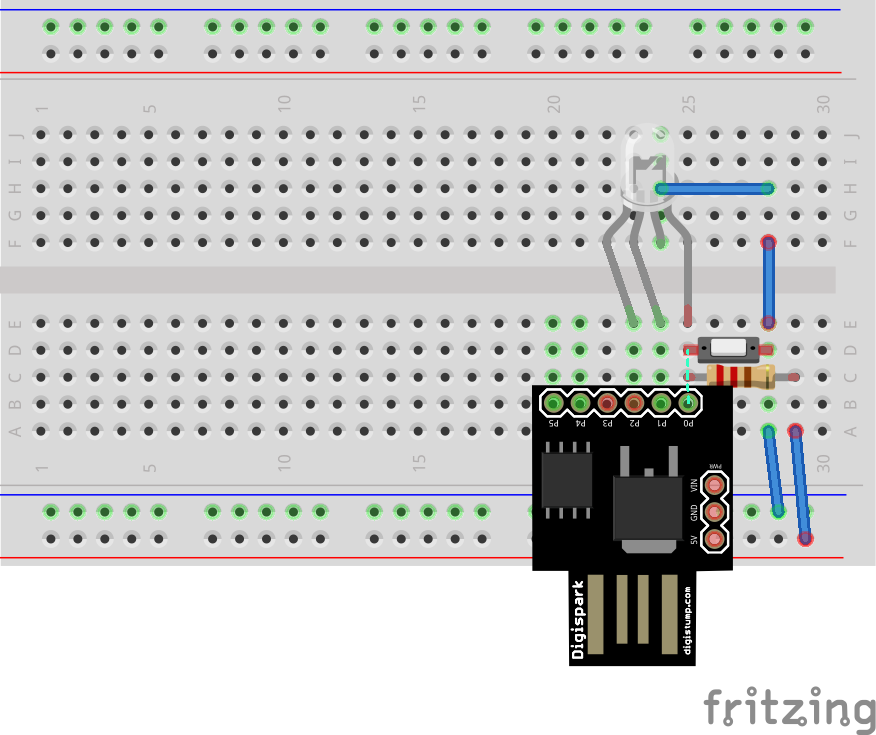Hardware components | ||||||
 |
| × | 1 | |||
 |
| × | 1 | |||
 |
| × | 1 | |||
 |
| × | 1 | |||
Software apps and online services | ||||||
| ||||||
Hand tools and fabrication machines | ||||||
 |
| |||||
Some projects like this are available on the internet
BUT no ones are made for arduino users
We just provide you a simple .hex file or a main.c wich you can't adapt and rebuild at your image ..
So i decided to create a new code from scratch in the arduino IDE with some adaptated librairies for the DigiStumb
SO !
Let's explain
The principe is simple, when you plug the usbKey, it type a password as a virtual keyboard
In my version, you have a little button on the board, you have to push it for 2 seconds, then it will generate a new password wich will be save in the eeprom
You just need :
- 1 x DigiStumb from Digispark (on amazon or on the internet)
- 1 x 1k Ohms pull-up resistor
- 1 x smd button
- Optional 1 RGB LED
#include "EEPROM.h"
#include "DigiKeyboard.h"
#include "time.h"
#define BLUEPIN 0
#define GREENPIN 1
#define REDPIN 2
// NO SPECIAL CHARS
char caracteres[] = {0x04, 0x05, 0x06, 0x07, 0x08, 0x09, 0x0A, 0x0B, 0x0C, 0x0D, 0x0E, 0x0F, 0x10, 0x11, 0x12, 0x13, 0x14, 0x15, 0x16, 0x17, 0x18, 0x19, 0x1A, 0x1B, 0x1C, 0x1D, 0x1E, 0x1F, 0x20, 0x21, 0x22, 0x23, 0x24, 0x25, 0x26, 0x27};
char motdepasse[21];
void setup() {
pinMode(REDPIN, OUTPUT);
pinMode(GREENPIN, OUTPUT);
pinMode(BLUEPIN, INPUT);
DigiKeyboard.sendKeyStroke(0);
DigiKeyboard.delay(1000);
int adressReg = 0;
int i = 0;
char carr;
while (i != 20) {
carr = EEPROM.read(adressReg);
if ((carr & 0b10000000) == 0b10000000) DigiKeyboard.sendKeyStroke(carr & 0b01111111, MOD_SHIFT_LEFT);
else DigiKeyboard.sendKeyStroke(carr & 0b01111111);
digitalWrite(GREENPIN, LOW);
adressReg++;
i++;
}
}
void loop() {
while (digitalRead(0) == HIGH);
DigiKeyboard.delay(2000);
if (digitalRead(0) == LOW) newPass();
}
void newPass() {
int adressEeprom = 0;
int i = 0;
digitalWrite(GREENPIN, HIGH);
DigiKeyboard.print("Nouvequ ;ot de pqsse en cours de generqtion");
DigiKeyboard.println();
DigiKeyboard.delay(50);
srand(millis()); // initialisation de rand
while (i != 20) {
digitalWrite(REDPIN, HIGH);
int randomChar = (rand() % 35);
int randomChoice = (rand() % 2) + 1;
char caractere = caracteres[randomChar];
if (randomChar > 26) caractere = caractere | 0b10000000;
if ((randomChoice == 1) && (randomChar <= 26)) caractere = caractere | 0b10000000;
EEPROM.update(adressEeprom, caractere);
adressEeprom ++;
i++;
digitalWrite(REDPIN, LOW);
}
digitalWrite(GREENPIN, LOW);
DigiKeyboard.println("Generqtion ter;inee 6 Voici le ;ot de pqsse .");
DigiKeyboard.delay(50);
setup();
while (digitalRead(0) == LOW);
}
/*
EEPROM.h - EEPROM library
Original Copyright (c) 2006 David A. Mellis. All right reserved.
New version by Christopher Andrews 2015.
This library is free software; you can redistribute it and/or
modify it under the terms of the GNU Lesser General Public
License as published by the Free Software Foundation; either
version 2.1 of the License, or (at your option) any later version.
This library is distributed in the hope that it will be useful,
but WITHOUT ANY WARRANTY; without even the implied warranty of
MERCHANTABILITY or FITNESS FOR A PARTICULAR PURPOSE. See the GNU
Lesser General Public License for more details.
You should have received a copy of the GNU Lesser General Public
License along with this library; if not, write to the Free Software
Foundation, Inc., 51 Franklin St, Fifth Floor, Boston, MA 02110-1301 USA
*/
#ifndef EEPROM_h
#define EEPROM_h
#include <inttypes.h>
#include <avr/eeprom.h>
#include <avr/io.h>
/***
EERef class.
This object references an EEPROM cell.
Its purpose is to mimic a typical byte of RAM, however its storage is the EEPROM.
This class has an overhead of two bytes, similar to storing a pointer to an EEPROM cell.
***/
struct EERef{
EERef( const int index )
: index( index ) {}
//Access/read members.
uint8_t operator*() const { return eeprom_read_byte( (uint8_t*) index ); }
operator const uint8_t() const { return **this; }
//Assignment/write members.
EERef &operator=( const EERef &ref ) { return *this = *ref; }
EERef &operator=( uint8_t in ) { return eeprom_write_byte( (uint8_t*) index, in ), *this; }
EERef &operator +=( uint8_t in ) { return *this = **this + in; }
EERef &operator -=( uint8_t in ) { return *this = **this - in; }
EERef &operator *=( uint8_t in ) { return *this = **this * in; }
EERef &operator /=( uint8_t in ) { return *this = **this / in; }
EERef &operator ^=( uint8_t in ) { return *this = **this ^ in; }
EERef &operator %=( uint8_t in ) { return *this = **this % in; }
EERef &operator &=( uint8_t in ) { return *this = **this & in; }
EERef &operator |=( uint8_t in ) { return *this = **this | in; }
EERef &operator <<=( uint8_t in ) { return *this = **this << in; }
EERef &operator >>=( uint8_t in ) { return *this = **this >> in; }
EERef &update( uint8_t in ) { return in != *this ? *this = in : *this; }
/** Prefix increment/decrement **/
EERef& operator++() { return *this += 1; }
EERef& operator--() { return *this -= 1; }
/** Postfix increment/decrement **/
uint8_t operator++ (int){
uint8_t ret = **this;
return ++(*this), ret;
}
uint8_t operator-- (int){
uint8_t ret = **this;
return --(*this), ret;
}
int index; //Index of current EEPROM cell.
};
/***
EEPtr class.
This object is a bidirectional pointer to EEPROM cells represented by EERef objects.
Just like a normal pointer type, this can be dereferenced and repositioned using
increment/decrement operators.
***/
struct EEPtr{
EEPtr( const int index )
: index( index ) {}
operator const int() const { return index; }
EEPtr &operator=( int in ) { return index = in, *this; }
//Iterator functionality.
bool operator!=( const EEPtr &ptr ) { return index != ptr.index; }
EERef operator*() { return index; }
/** Prefix & Postfix increment/decrement **/
EEPtr& operator++() { return ++index, *this; }
EEPtr& operator--() { return --index, *this; }
EEPtr operator++ (int) { return index++; }
EEPtr operator-- (int) { return index--; }
int index; //Index of current EEPROM cell.
};
/***
EEPROMClass class.
This object represents the entire EEPROM space.
It wraps the functionality of EEPtr and EERef into a basic interface.
This class is also 100% backwards compatible with earlier Arduino core releases.
***/
struct EEPROMClass{
//Basic user access methods.
EERef operator[]( const int idx ) { return idx; }
uint8_t read( int idx ) { return EERef( idx ); }
void write( int idx, uint8_t val ) { (EERef( idx )) = val; }
void update( int idx, uint8_t val ) { EERef( idx ).update( val ); }
//STL and C++11 iteration capability.
EEPtr begin() { return 0x00; }
EEPtr end() { return length(); } //Standards requires this to be the item after the last valid entry. The returned pointer is invalid.
uint16_t length() { return E2END + 1; }
//Functionality to 'get' and 'put' objects to and from EEPROM.
template< typename T > T &get( int idx, T &t ){
EEPtr e = idx;
uint8_t *ptr = (uint8_t*) &t;
for( int count = sizeof(T) ; count ; --count, ++e ) *ptr++ = *e;
return t;
}
template< typename T > const T &put( int idx, const T &t ){
EEPtr e = idx;
const uint8_t *ptr = (const uint8_t*) &t;
for( int count = sizeof(T) ; count ; --count, ++e ) (*e).update( *ptr++ );
return t;
}
};
static EEPROMClass EEPROM;
#endif
/*
time.h - low level time and date functions
*/
/*
July 3 2011 - fixed elapsedSecsThisWeek macro (thanks Vincent Valdy for this)
- fixed daysToTime_t macro (thanks maniacbug)
*/
#ifndef _Time_h
#ifdef __cplusplus
#define _Time_h
#include <inttypes.h>
#ifndef __AVR__
#include <sys/types.h> // for __time_t_defined, but avr libc lacks sys/types.h
#endif
#if !defined(__time_t_defined) // avoid conflict with newlib or other posix libc
typedef unsigned long time_t;
#endif
// This ugly hack allows us to define C++ overloaded functions, when included
// from within an extern "C", as newlib's sys/stat.h does. Actually it is
// intended to include "time.h" from the C library (on ARM, but AVR does not
// have that file at all). On Mac and Windows, the compiler will find this
// "Time.h" instead of the C library "time.h", so we may cause other weird
// and unpredictable effects by conflicting with the C library header "time.h",
// but at least this hack lets us define C++ functions as intended. Hopefully
// nothing too terrible will result from overriding the C library header?!
extern "C++" {
typedef enum {timeNotSet, timeNeedsSync, timeSet
} timeStatus_t ;
typedef enum {
dowInvalid, dowSunday, dowMonday, dowTuesday, dowWednesday, dowThursday, dowFriday, dowSaturday
} timeDayOfWeek_t;
typedef enum {
tmSecond, tmMinute, tmHour, tmWday, tmDay,tmMonth, tmYear, tmNbrFields
} tmByteFields;
typedef struct {
uint8_t Second;
uint8_t Minute;
uint8_t Hour;
uint8_t Wday; // day of week, sunday is day 1
uint8_t Day;
uint8_t Month;
uint8_t Year; // offset from 1970;
} tmElements_t, TimeElements, *tmElementsPtr_t;
//convenience macros to convert to and from tm years
#define tmYearToCalendar(Y) ((Y) + 1970) // full four digit year
#define CalendarYrToTm(Y) ((Y) - 1970)
#define tmYearToY2k(Y) ((Y) - 30) // offset is from 2000
#define y2kYearToTm(Y) ((Y) + 30)
typedef time_t(*getExternalTime)();
//typedef void (*setExternalTime)(const time_t); // not used in this version
/*==============================================================================*/
/* Useful Constants */
#define SECS_PER_MIN ((time_t)(60UL))
#define SECS_PER_HOUR ((time_t)(3600UL))
#define SECS_PER_DAY ((time_t)(SECS_PER_HOUR * 24UL))
#define DAYS_PER_WEEK ((time_t)(7UL))
#define SECS_PER_WEEK ((time_t)(SECS_PER_DAY * DAYS_PER_WEEK))
#define SECS_PER_YEAR ((time_t)(SECS_PER_WEEK * 52UL))
#define SECS_YR_2000 ((time_t)(946684800UL)) // the time at the start of y2k
/* Useful Macros for getting elapsed time */
#define numberOfSeconds(_time_) (_time_ % SECS_PER_MIN)
#define numberOfMinutes(_time_) ((_time_ / SECS_PER_MIN) % SECS_PER_MIN)
#define numberOfHours(_time_) (( _time_% SECS_PER_DAY) / SECS_PER_HOUR)
#define dayOfWeek(_time_) ((( _time_ / SECS_PER_DAY + 4) % DAYS_PER_WEEK)+1) // 1 = Sunday
#define elapsedDays(_time_) ( _time_ / SECS_PER_DAY) // this is number of days since Jan 1 1970
#define elapsedSecsToday(_time_) (_time_ % SECS_PER_DAY) // the number of seconds since last midnight
// The following macros are used in calculating alarms and assume the clock is set to a date later than Jan 1 1971
// Always set the correct time before settting alarms
#define previousMidnight(_time_) (( _time_ / SECS_PER_DAY) * SECS_PER_DAY) // time at the start of the given day
#define nextMidnight(_time_) ( previousMidnight(_time_) + SECS_PER_DAY ) // time at the end of the given day
#define elapsedSecsThisWeek(_time_) (elapsedSecsToday(_time_) + ((dayOfWeek(_time_)-1) * SECS_PER_DAY) ) // note that week starts on day 1
#define previousSunday(_time_) (_time_ - elapsedSecsThisWeek(_time_)) // time at the start of the week for the given time
#define nextSunday(_time_) ( previousSunday(_time_)+SECS_PER_WEEK) // time at the end of the week for the given time
/* Useful Macros for converting elapsed time to a time_t */
#define minutesToTime_t ((M)) ( (M) * SECS_PER_MIN)
#define hoursToTime_t ((H)) ( (H) * SECS_PER_HOUR)
#define daysToTime_t ((D)) ( (D) * SECS_PER_DAY) // fixed on Jul 22 2011
#define weeksToTime_t ((W)) ( (W) * SECS_PER_WEEK)
/*============================================================================*/
/* time and date functions */
int hour(); // the hour now
int hour(time_t t); // the hour for the given time
int hourFormat12(); // the hour now in 12 hour format
int hourFormat12(time_t t); // the hour for the given time in 12 hour format
uint8_t isAM(); // returns true if time now is AM
uint8_t isAM(time_t t); // returns true the given time is AM
uint8_t isPM(); // returns true if time now is PM
uint8_t isPM(time_t t); // returns true the given time is PM
int minute(); // the minute now
int minute(time_t t); // the minute for the given time
int second(); // the second now
int second(time_t t); // the second for the given time
int day(); // the day now
int day(time_t t); // the day for the given time
int weekday(); // the weekday now (Sunday is day 1)
int weekday(time_t t); // the weekday for the given time
int month(); // the month now (Jan is month 1)
int month(time_t t); // the month for the given time
int year(); // the full four digit year: (2009, 2010 etc)
int year(time_t t); // the year for the given time
time_t now(); // return the current time as seconds since Jan 1 1970
void setTime(time_t t);
void setTime(int hr,int min,int sec,int day, int month, int yr);
void adjustTime(long adjustment);
/* date strings */
#define dt_MAX_STRING_LEN 9 // length of longest date string (excluding terminating null)
char* monthStr(uint8_t month);
char* dayStr(uint8_t day);
char* monthShortStr(uint8_t month);
char* dayShortStr(uint8_t day);
/* time sync functions */
timeStatus_t timeStatus(); // indicates if time has been set and recently synchronized
void setSyncProvider( getExternalTime getTimeFunction); // identify the external time provider
void setSyncInterval(time_t interval); // set the number of seconds between re-sync
/* low level functions to convert to and from system time */
void breakTime(time_t time, tmElements_t &tm); // break time_t into elements
time_t makeTime(tmElements_t &tm); // convert time elements into time_t
} // extern "C++"
#endif // __cplusplus
#endif /* _Time_h */








_3u05Tpwasz.png?auto=compress%2Cformat&w=40&h=40&fit=fillmax&bg=fff&dpr=2)
Comments
Please log in or sign up to comment.